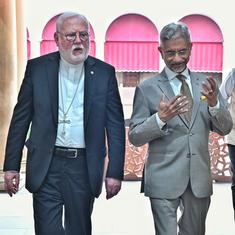This week, three separate benches of the Supreme Court spoke of restricting freedom of speech on social media.
On Monday, a bench of Justices BV Nagarathna and Justice KV Viswanathan was hearing a petition by Kolkata-based Wazahat Khan seeking the consolidation of first information reports registered against him in Assam, Maharashtra, Delhi and Haryana over his social media posts.
In his posts, Khan had made allegedly offensive remarks about Hindu deities and festivals. Since last month, he has been under arrest for the posts by the West Bengal Police.
The bench continued the interim protection the court had granted Khan from arrest in the cases registered outside Bengal. But during the hearing, Nagarathna called for citizens to “regulate themselves” on social media and exercise “self restraint … to enjoy” the right to free speech and expression.
She noted that the “abuse of that freedom” was leading to the “clogging of courts” – without providing any data to support this claim. She then called for “guidelines to be issued to the citizens to comply”.
Over Monday and Tuesday, another bench of the court comprising Justices Sudhanshu Dhulia and Arvind Kumar heard an anticipatory bail plea by Indore-based cartoonist Hemant Malviya. Malviya had been booked in May for hurting religious sentiments.
His offence? Posting on social media a cartoon he had made in 2021 depicting a satirical situation featuring Prime Minister Narendra Modi and a man dressed in what may appear to some as the uniform of the Rashtriya Swayamsewak Sangh, the parent organisation of the ruling Bharatiya Janata Party.
Earlier this month, the Madhya Pradesh High Court had not only rejected his application for anticipatory bail but also called for his arrest.
The bench of Dhulia and Kumar granted Malviya interim protection from arrest. However, it called his cartoons “inflammatory”, “immature” and “offensive”. Describing this as a widespread problem, Dhulia said on Tuesday that the court would “have to do something on this”, adding that “there should be a test”, presumably about what may be permitted to be posted online.
That same day, a bench of Justices Surya Kant and Joymalya Bagchi heard three petitions that it was hearing together. Two of the petitions were by YouTubers Ranveer Allahbadia and Ashish Chanchlani to club the FIRs filed against them in parts of the country and one by charitable organisation SMA Cure Foundation against comedians Samay Raina, Vipun Goyal, Balraj Paramjeet Singh Ghai, Sonali Thakkar and Nishant Jagdish Tanwar for making jokes about persons with disabilities.
During the hearing, Kant told the attorney general that any guidelines framed by the government to regulate online content must “balance” freedoms and duties. To be clear, under India’s constitutional framework, fundamental duties are not grounds to restrict the freedom of speech and expression – or any other fundamental right.
In February, while hearing Allahbadia’s petition, Kant had first nudged the government to regulate obscene content on YouTube and said that the court “would like to do something” and not “leave this vacuum”.
Each of these cases illustrates judicial overreach. In none of these cases had the parties sought regulations on online speech.
Ideally, the court would have restricted itself to the actual subject of the petitions and adjudicated on them. Instead, it went into the tone and tenor of specific items of online content – not whether these constituted criminal offences – and has called for an online censorship regime.
This trend does not bode well for free speech in India.
It has revived the Union government’s efforts to push for a sweeping Broadcasting Bill. Last year, it had mooted such a bill ahead of the Lok Sabha elections but withdrew it in August amid allegations by news associations and civil society organisations that it impinged on free speech online.
It also leads to the right to free speech being circumscribed by public outrage and the sensibilities of judges.
The Supreme Court, and all other courts, would do well to remember the judgement delivered in March by a bench comprising Justices AS Oka and Ujjal Bhuyan.
Quashing an FIR registered against Congress MP Imran Pratapgarhi for an Instagram post, the judgement, written by Oka, said: “Sometimes, we, the judges, may not like spoken or written words. But, still, it is our duty to uphold the fundamental right under Article 19(1)(a).”
Here is a summary of the week’s top stories.
Opposition leader’s son held. The Enforcement Directorate arrested Chaitanya Baghel, the son of Chhattisgarh’s former Chief Minister Bhupesh Baghel, in a liquor scam case. The action came after the central agency conducted searches at their home in Durg district.
The agency has alleged that a syndicate of officials, politicians and others ensured a state-run firm bought liquor only from select distributors who paid a commission. This action, the authorities alleged, resulted in over Rs 2,000 crore being diverted from the state exchequer between 2019 and 2022. Chaitanya Baghel received the proceeds of crime generated from the bootlegging of alcohol, claimed the Enforcement Directorate.
Bhupesh Baghel claimed on Friday that the agency’s action was an attempt to stop him from asking questions in the Assembly about the trees being allegedly felled by the Adani Group.
Respite for Indian nurse. Yemeni authorities agreed to postpone the execution of Malayali nurse Nimisha Priya, which had been scheduled for Wednesday. No new date has been announced.
This came a day after the Union government told the Indian Supreme Court that it could not do much more to prevent the action.
Hailing from Kerala’s Palakkad, Priya was imprisoned in Yemen for the alleged murder of Yemeni citizen Talal Abdo Mehdi in July 2017. In 2020, Priya had been sentenced to death by a trial court in the Yemeni capital Sanaa. On December 30, news reports claimed that Rashad al-Alimi, the chairperson of Yemen’s Presidential Leadership Council, had approved the sentence.
Assam eviction drive turns violent. A 19-year-old was killed and several injured after the Assam Police opened fire at protesters amid clashes at the site of an eviction drive in the Betbari area of Goalpara district. At least two police personnel were among the injured.
Ten persons were arrested in connection with the violence.
Authorities had cleared 140 hectares of land in the Paikan Reserve Forest on Saturday, displacing 1,080 families, most of whom were Muslims of Bengali origin. Since then, the displaced families have been living in tents and tarpaulin huts, which officials had asked them to dismantle. The clashes broke out on Thursday after authorities dug up the road that provided connectivity to the settlement.
How can Indian democracy allow the open oppression of Bengali-origin Muslims by Assam? asks Shoaib Daniyal
The state blames the police. Karnataka Police officers acted like “servants” of the Indian Premier League team Royal Challengers Bengaluru, the state government told the High Court hearing the case about the stampede outside Bengaluru’s Chinnaswamy Stadium. Eleven persons were killed during the stampede on June 4.
The state government also told the court that police officers had started making arrangements for celebrations after the team’s victory in the league without ascertaining who had permitted the event. Further, the government claimed that the cricket team had submitted an application proposing a celebration even before the final match.
The government defended the suspension of Additional Commissioner of Police Vikash Kumar Vikash, accusing him of failing to do his duty and causing “public embarrassment”.
Also on Scroll last week
- Why Bengali migrant workers in BJP-ruled states are being asked to prove they are Indians
- How a landmark Kerala High Court judgment recognised existence of transgender families
- A Jammu family’s fight to get their mother back from Pakistan
- Why climbing a fence in Kashmir might not be enough for Omar Abdullah to keep his promises
- Why workers who grow one of the world’s finest teas face an uncertain future
- How ‘glof’ became a common word in Sikkim – and why it haunts people two years later
- Hindi’s Hindutva problem that supporters are not ready to reckon with
- India claims to be a leader of the Global South – but its strategic silences subvert that assertion
- Interview: ‘Feminist Fathima’ is a ‘challenge to people who don’t want to change with the times’
- ‘Special Ops 2.0’ review: Kay Kay Menon-led suspense thriller often resists momentum
Follow the Scroll channel on WhatsApp for a curated selection of the news that matters throughout the day, and a round-up of major developments in India and around the world every evening. What you won’t get: spam.
And, if you haven’t already, sign up for our Daily Brief newsletter.










